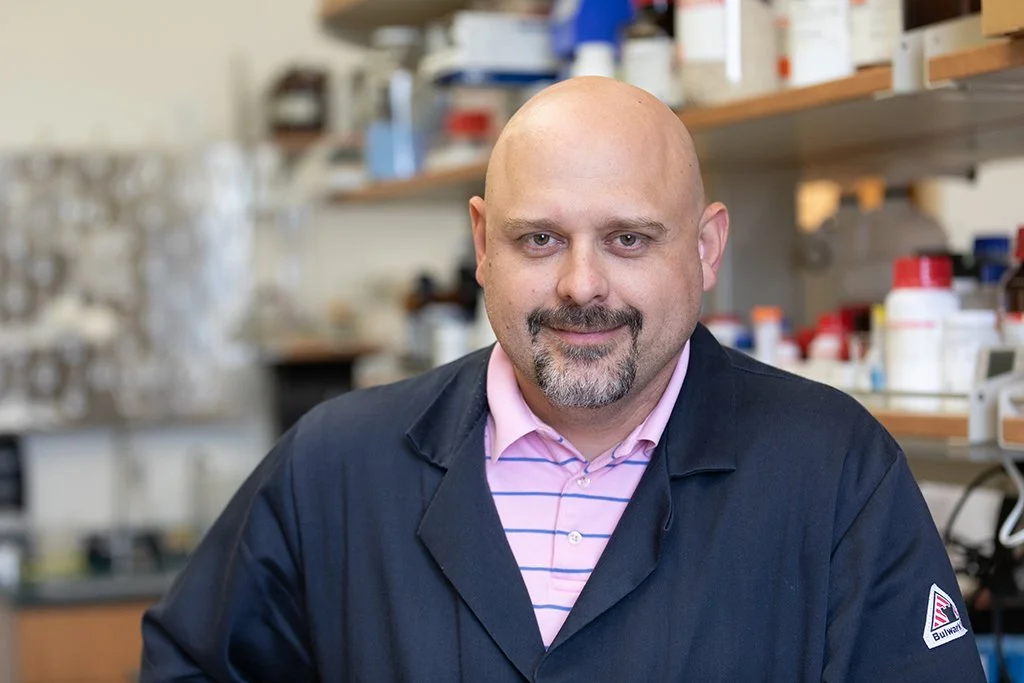current projects
Dr. Shapiro leads a translational research laboratory investigating the kidney cancer tumor immune microenvironment. His research seeks to understand how chemokine signaling modulates immune exclusion, potentially driving treatment resistance and metastasis. His work integrates spatial transcriptomics, single-cell sequencing, murine models of kidney cancer, and microphysiologic platforms to study T cell signaling. The overarching goal is to identify novel biomarkers and therapeutic targets to improve kidney cancer outcomes.
For his work with the AKCI, Dr. Gau plans to investigate Profilin-1’s role in mitochondrial dysfunction in chromophobe renal cell carcinoma (ChRCC), a rare and understudied subtype of kidney cancer. His lab leverages genetic models, patient-derived cell lines, and emerging small molecule inhibitors to evaluate the therapeutic potential of targeting cytoskeleton–mitochondria crosstalk in ChRCC. Dr. Gau’s long-term vision is to develop mechanism-based treatment strategies for aggressive and treatment-resistant kidney cancers by integrating cellular bioengineering, molecular biology, and translational therapeutics.
Dr. Gulati’s research aims to gain a better understanding of the metabolic reprogramming that occurs during progression in clear cell renal cell carcinoma (ccRCC), and she seeks to define a specific “metabolic phenotype” that would be capable of surviving in metastatic tumor microenvironments using live cell analysis and spatial transcriptomics. Through these efforts, Dr. Gulati hopes to provide a deep understanding of tumor heterogeneity and dysregulated tumor metabolism in ccRCC. In addition to utilizing these techniques to define prognosis, she will be able to nominate new therapeutic approaches for tumors that enrich for specific pathways, thus paving the path for future clinical trials.
Dr. Chen Yao is an assistant professor in the Department of Immunology and the Kidney Cancer Program at UT Southwestern Medical Center. Having earned her Ph.D. from the University of Minnesota under the guidance of Dr. Daniel Kaplan, Dr. Yao furthered her expertise through postdoctoral training in the systems immunology laboratory led by Dr. John O'Shea at the National Institutes of Health. Leveraging advanced computational and experimental techniques, the Yao lab focuses on uncovering transcriptional, epigenetic, and metabolic pathways that govern T cell differentiation and function during cancer and chronic viral infection. Dr. Yao's research in the AKCI focuses on investigating the role of stem-like CD8 T cells in immunotherapy against renal cell cancer.
Maxine Sun, under the mentorship of Dr. Toni Choueiri at Dana-Farber Cancer Institute (DFCI), serves as a research scientist in the Lank Center for Genitourinary Oncology. Her investigative pursuits center on uncovering shared etiological factors between cancer and cardiovascular disease, with a special focus on inflammation. Boasting a robust foundation in statistical epidemiology and biomedical sciences, her work within the AKCI is dedicated to exploring the influence of clonal hematopoiesis on cardiovascular health in patients diagnosed with kidney cancer. Additionally, her research aims to deepen our understanding of the genetic interplay between renal cell carcinoma and hematopoietic-related phenotypes, such as mosaic loss of the Y chromosome and clonal hematopoiesis of indeterminate potential. Through her efforts, Maxine seeks to enrich our comprehension of the link between clonal hematopoiesis and kidney cancer, ultimately enhancing patient prognoses and outcomes.
Dr. Kundu is trained in epigenetics, metabolism, epitranscriptomics, and cell signaling axes of clear cell renal cell carcinoma (ccRCC), the most prevalent form of the kidney cancer. In his research, Dr. Kundu identified a member of semaphorin family, semaphorin 5B (Sema5B) in ccRCC that is upregulated through VHL-mutation and HIF-stabilization in the disease. Sema5B level in ccRCC is highest compared to any normal and tumor tissues. Moreover, Sema5B depletion in ccRCC cells reduces their proliferative potential in in vitro and in vivo models, which suggests its oncogenic role in ccRCC. Sema5B's function in normal and any disease physiology is largely unknown except for the fact that it was studied as an axon guidance molecule. Moreover, Sema5B protein biology and its mechanism of action are completely unknown. Semaphorins are generally regarded as single-pass cell membrane molecules signaling through their interaction with plexin/neuropilin. However, their alternate cellular locations have never been appreciated. Through his AKCI-ECS funding, Dr. Kundu aims to study the compartmentalization of Sema5B in RCC cell, the mechanism of Sema5B-driven ccRCC progression and its therapeutic liabilities.
Dr. Aguirre de Cubas, PhD, an Assistant Professor of Microbiology and Immunology at the Medical University
of South Carolina (MUSC). Recently, Dr. de Cubas’ research program focuses on 1) understanding how SETD2
deficiency contributes to the development and progression of renal cell carcinoma (RCC), and 2)
understanding molecular determinants of immunogenicity and antigenicity in this disease. To accomplish
these goals, Dr. de Cubas’ research program operates at both dry and wet lab levels and brings a balanced
skillset in genomics and bioinformatics, as well as cancer biology and immunology.
Dr. David Schoenfeld is an Assistant Professor of Medicine (Medical Oncology) at the Yale School of Medicine and Yale Cancer Center, where he cares for patients with kidney cancer and melanoma and conducts basic and translational research into these diseases. He received his medical degree and a Ph.D. in Cellular, Molecular, and Biomedical Studies from Columbia University as part of the Medical Scientist Training Program. He conducted his Ph.D. research in the lab of Dr. Ramon Parsons, investigating mechanisms of tumor suppression by PBRM1, a subunit of a large SWI/SNF chromatin remodeling complex that is recurrently mutated in cancer, particularly clear cell renal cell carcinoma. Dr. Schoenfeld then joined the ABIM Physician-Scientist Training Program at Yale through which he completed Internal Medicine residency and Hematology/Oncology fellowship training, under the clinical and research mentorship of Dr. Harriet Kluger. He has extensive scientific training in molecular and cellular biology, epigenetics, and cellular immunology. Dr. Schoenfeld’s research aims to gain a better understanding of the tumor immune microenvironment in renal cell carcinoma, develop better biomarkers of response to immunotherapy, and bring new immunotherapies to patients through preclinical studies and early phase clinical trials. For his work with the AKCI, he is investigating the efficacy and basis for anti-tumor immunity of a decoy-resistant IL-18 in combination with immune checkpoint inhibitors in murine and ex vivo patient-derived models of renal cell carcinoma. Through these efforts, Dr. Schoenfeld hopes to provide a solid scientific foundation to rapidly initiate an early phase clinical trial testing the most promising regimens in patients with advanced renal cell carcinoma.
The Carbonic Anhydrase 9 is a cell surface protein overexpressed in over 90% of clear cell renal cell carcinomas, making it an attractive drug target for both diagnostic imaging and therapy. We have developed a novel series of small molecule binders with unprecedented potency and selectivity for Ca9. In this project, we will develop novel CA9-targeted radiopharmaceutical agents based on these binders, delivering systemic radiotherapy to ccRCC tumors while sparing healthy tissues. We anticipate that our proposed therapy will improve the overall survival and quality of life of ccRCC patients by offering a treatment alternative with excellent response rates and tolerability.
Recurrent Genomic Alterations Driving Clear Cell Renal Cell Carcinoma Development
Peter Ly, Ph.D., University of Texas Southwestern Medical Center
Clear cell renal cell carcinomas (ccRCCs) are genetically characterized by the near-universal loss of chromosome 3p and gain of chromosome 5q. These recurrent genomic alterations are often driven by chromothripsis, a highly mutagenic process involving the catastrophic fragmentation of individual chromosomes followed by its reassembly through error-prone DNA repair mechanisms. Chromothripsis can be initiated by mitotic cell division errors that generate micronuclei, abnormal nuclear structures that entrap individual chromosomes and renders them susceptible to fragmentation. With the mentorship of Dr. James Brugarolas (University of Texas Southwestern Medical Center), Dr. Peter Ly aims to investigate the contributions of chromosome 3p and 5q chromothripsis to the development of ccRCC. Dr. Ly has previously established methods to induce chromosome-specific micronuclei and chromothripsis, and he plans to translate this expertise into reconstructing the genomic events underlying ccRCC evolution. The overall goal of this project is to identify recurrent patterns of 3p and 5q rearrangements that are capable of transforming normal diploid cells into malignant ccRCC tumors. The results of this research will advance our mechanistic understanding of how chromosome-specific alterations contribute to ccRCC tumorigenesis.
Dr. Xu is working to develop blood-based biomarkers that can be used to detect and monitor kidney cancer. He is mentored in this work by Dr. Matthew L. Freedman (Dana-Farber Cancer Institute), and is also mentored closely by Dr. David McDermott (Beth Israel Deaconess Medical Center) and Dr. Toni K. Choueiri (Dana-Farber Cancer Institute). In this project, Dr. Xu will assess the performance of two blood-based tests, plasma kidney injury molecule-1 (KIM-1) and cfMeDIP-seq. KIM-1 is a transmembrane protein which is overexpressed in clear cell and papillary kidney cancer, and has a cleavable extracellular domain which circulates in plasma. cfMeDIP-seq is a technique that uses differential methylation patterns to sensitively detect small amounts of circulating tumor DNA. By detecting two different components of kidney cancer, these tests might overcome the limited precision of prior blood tests. First, Dr. Xu will measure KIM-1 in blood collected prior to surgery from patients with suspicious kidney masses, to test whether KIM-1 and cfMeDIP-seq can predict which patients have kidney cancer. Second, he will measure KIM-1 in patients who completed surgery for kidney cancer, and determine whether patients with higher plasma KIM-1 have higher chance of cancer recurrence and may benefit from additional treatment. Third, he will measure KIM-1 in blood samples from patients with advanced kidney cancer to test whether KIM-1 can help to predict survival in these patients, and whether decrease in KIM-1 after treatment predicts response to treatment. This project, if successful, could lead to the first minimally invasive blood tests that can guide the diagnosis and treatment of kidney cancer.










